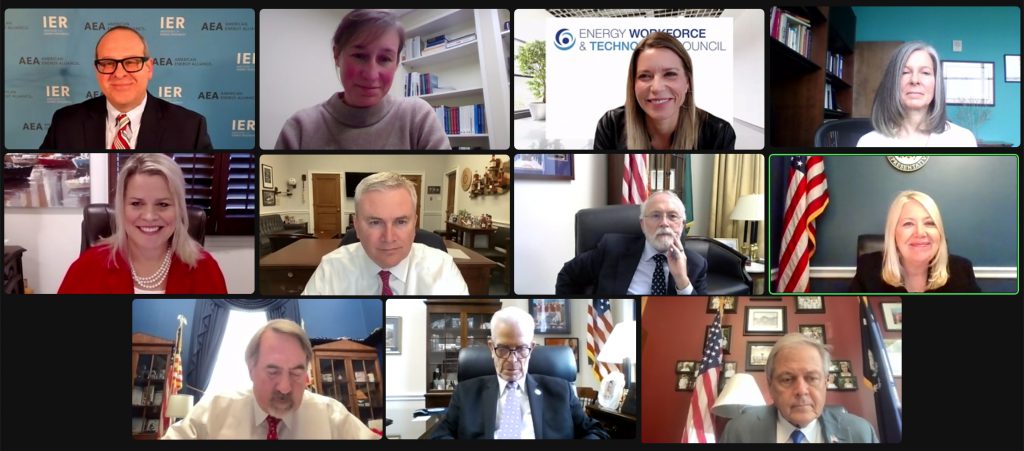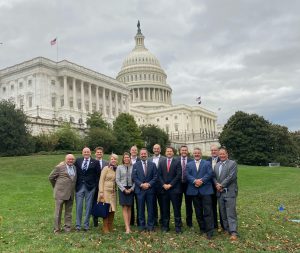Advocacy by the Energy Workforce & Technology Council, both at the state and federal level, delivered valuable victories for its Member Companies in 2021. While politics constantly change, this past year has brought a number of significant challenges facing the industry and Member Companies.
The Government Affairs team, which grew this past year with the additions of Deidre Kohlrus, Director Government Affairs and Phillip DeBauche, Director Technical & Environment, continued to elevate the industry by significantly expanding the regulatory involvement of the organization, as well as engaging with governments, industry partners and communities through its activities.
Legislative Advocacy
Federal Lands
The Council worked with the Biden Administration and members of Congress on issues that Member Companies faced as the economy started to pull itself out of a post-pandemic slump and global energy demand increased. The year began with the Biden Administration, through the Department of Interior, instituting a federal moratorium on new oil and gas leases on federal lands and waters. The Council quickly formed an advocacy coalition with other trade associations to push back against this faulty policy. In addition to directly engaging with the Department of Interior, the Council met with dozens of members of Congress to discuss the ban and the implications of the policy to American jobs and energy prices.
Taxes and Royalty Payments
When the ban was ultimately thrown out by the federal courts, focus turned to legislative action in Congress, such as the “reconciliation” package and ultimately “Build Back Better.” The Council worked with allies on both sides of the aisle to ensure that the most damaging tax and policy provisions did not report out of committees and make it into the final package.
While the prospects of the original “Build Back Better” package passing appear unlikely, there is still an outside possibility that it is broken up into smaller packages of which many of the energy provisions could re-emerge. The Council continues to push hard against policies that will make the production of domestic energy more expensive. Council CEO Leslie Beyer testified last month in front of a joint panel compromised of the House Western Caucus and the House Oversight and Government Reform Committees to urge Congress to support the industry and oppose policies that would hamper domestic energy production.
Orphaned Wells
The Council also continues to significantly engage in support of legislation that provides a stream of federal money to states for the plugging of orphaned wells. Council SVP Government Affairs Tim Tarpley testified in front of the House on behalf of the energy technology and services sector during a congressional hearing on April 15 about Rep. Teresa Leger Fernandez’s (D-NM-3) “Orphaned Well Clean-up and Jobs Act of 2021,” which proposed a three-tiered grant program allocating $7.2 billion to remediate wells on state and private lands.
In his testimony, Tarpley highlighted how Council Member Companies are spearheading the efforts to plug and remediate orphaned wells across the country. He highlighted A-Plus Well Services, a Member Company based in Farmington, NM. A-Plus is a model for how using federal funds to expand existing state well plugging programs could benefit the environment, create jobs, and solve the critical issues surrounding uncapped orphaned wells.
During this testimony, Tarpley also expressed support for the REGROW Act, a slightly different proposal, which ultimately did pass both the House and Senate to become law. Funds from this program are currently being distributed to the states, and each state will begin to accept applications from well servicing companies to do this work in the coming months. The Council has also formed an orphaned well plugging best practices working group, which is creating a best practices document that can be shared with participating states and ensure that all work is done correctly and to industry practice. To contribute to this working group, please contact SVP Government Affairs Tim Tarpley.
Advocacy in 2021 culminated with 30 participants from more than 20 Member Companies heading to Washington, DC in October to meet with legislators and Biden Administration leaders to discuss the energy services and technology sector. Member Company representatives had the opportunity to meet with more than 30 Senators and Congressmen and hear perspectives from senior officials from four executive branch agencies.
Regulatory Action
‘NEPA Rule’
In addition to legislative action at the federal level, the Biden Administration also moved forward with significant regulatory actions in 2021 that have serious impacts to our sector. In November, the Council commented on the proposed changes to the “NEPA Rule” that had been modified during the Trump Administration. The Council’s comments reiterated the role our sector plays in the development of clean energy technologies, and how our companies are able to meet global demand in the most efficient way possible. The comments urged the Council on Environmental Quality to use any regulatory changes to bolster investment and growth of the important clean energy technologies that our Member Companies are developing, and reiterated how unnecessary bureaucracy can endanger our domestic energy security and reliability.
Supply Chain
To address growing concerns around a global supply chain crunch, the Council formed a working group consisting of seven Member Companies to discuss issues surrounding how the crisis has affected the energy industry. The working group’s goal is to continue to highlight the significant contributions our sector is making to the supply chain that have enabled lower carbon emissions and renewable technology energy development.
The Council’s recent comments to the Department of Energy were an opportunity to open the door for collaboration and build on the relationships the Council has made with officials in the Administration. The Council emphasized the complexity of the technologies and processes of many of these clean energy projects and stressed the importance of access to products and materials. The letter also encouraged the development of a robust energy supply chain that bolsters the ability of Member Companies to continue to produce and scale these projects.
Methane Rule
In early November of last year, the Environmental Protection Agency (EPA) released a statement indicating that the agency intended to move forward with additional regulation of methane from oil and gas operations. The proposed Clean Air Act rules target emissions requirements that are currently on the books for new, modified and reconstructed sources in the oil and gas industry.
The Council’s comments to the EPA highlighted the existing operations and technologies that are deployed by Member Companies that have led to record-low overall emissions levels. From optical imaging to flaring mitigation, Council Member companies are, and have been, employing effective and efficient emissions-reducing practices technologies in the industry for over ten years.
Vaccine Mandate
Faced with the prospect of a potential OSHA rule requiring U.S. companies with over 100 employees to either mandate a COVID-19 vaccine or set up a weekly testing program, the Government Affairs team along with the HSE Committee sprang into action and hosted a dozen best practice sharing roundtables that shared experiences and plans for implementing the requirements of the rule.
Additionally, in anticipation of a final rule, the Council created a working group that developed comments to the Emergency Temporary Standard that expressed the need to keep the workplace safe and how vaccines could be an effective way to protect employees from COVID-19. The comments also acknowledged the complexity of the issue by considering natural immunity, workplace settings and other specific issues that made the blanket rule difficult to manage. The mandate was ultimately put on hold and rescinded by OSHA after a Supreme Court ruling stayed a lower court decision that stayed the implementation.
The Energy Workforce and Technology Council Government Affairs team will continue to push forward our advocacy efforts in 2022, and we look forward to working with all of our Member Companies to tell the excellent story of the men and woman of our sector who bring affordable, clean energy to the country and the world.
How to Get Involved
If you would like to join the Council’s advocacy efforts, including the current orphaned wells working group, contact SVP Government Affairs Tim Tarpley.
Click here to subscribe to the Council’s newsletter, which highlights sector-specific issues, best practices, Council activities and more.







